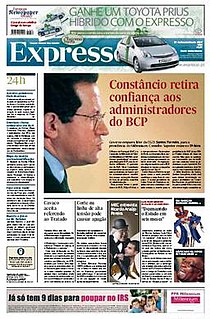This is a timeline of Portuguese history, comprising important legal and territorial changes and political events in Portugal and its predecessor states. To read about the background to these events, see History of Portugal.

Jornal de Notícias (JN) is a Portuguese daily national newspaper, one of the oldest in Portugal.

Correio da Manhã is a Portuguese tabloid daily newspaper in Portugal. Published in Lisbon, it is the most circulated and the leading daily newspaper in Portugal.

Público is a Portuguese daily national newspaper published in Lisbon, Portugal.

Expresso is the flagship publication of the Group Impresa and is published weekly in Lisbon, Portugal.

O Jogo is a Portuguese daily sport newspaper published in Porto.

Diário de Notícias is a Portuguese daily newspaper published in Lisbon, Portugal.
Record is a Portuguese sports newspaper, founded by Manuel Dias, published in Lisbon. Although it covers most sports, football is the focal point of it, and almost always is the only sport referred to on the cover.

Francisco de Holanda was a Portuguese court painter, architect, and sculptor for King João III of Portugal, and later for Sebastian of Portugal. He is considered to be one of the most important figures of the Portuguese Renaissance. Francisco was also an essayist, architect and historian. He represented the intelligible reality of the Holy Trinity through a "hypothetical" syntax of geometrical figures. He insisted on the contrast between the ideal plane, the incorporeal form and the "imperfect copy in the terrestrial zone". His visual language demonstrated a mixture of Neoplatonism, Christian Kabbalah and finally Lullism. In education, Francisco de Holanda emphasized mathematics and geometry, subsequently anticipating Clavius's reforms of the late 16th century. Sylvie Deswarte said that "Francisco de Holanda gives a privileged place to cosmography and astrology in the education of the painter. On par with geometry, mathematics and perspective, he recommended them [...] in order to reach the heavens in the hope of one day arriving to the Empyrean and realizing celestial works."
O Século was a Portuguese daily newspaper published in Lisbon, Portugal, from 1881 to 1977.

Partido da Imprensa Golpista is a term used by left-wing Brazilian websurfers since 2007 to characterize an alleged attitude of the Brazilian mass media towards President Luiz Inácio Lula da Silva during the 2006 presidential election. The term was popularized by journalist Paulo Henrique Amorim in his blog. Whenever he uses the term, Amorim writes it with an "i" in lowercase as a pun with the name of the web portal "iG". where he was a journalist before he was dismissed on March 18, 2008, which he describes as a process of "ideological cleansing".
The following is a timeline of the history of the city of Rio de Janeiro, Brazil.
The following is a timeline of the history of the city of Lisbon, Portugal.
The Protected Areas of the Azores are the basic administrative-territorial and conservation structures in the archipelago of the Azores and the surrounding oceans. The areas integrate the entirety of the Azores within its Exclusive Economic Zone, as well as the surrounding waters, under the international agreements and conventions. The network realizes the categorization of management for protected areas adopted by the International Union for Conservation of Nature (IUCN), adapting it to the specific geographical, environmental, cultural and political-administrative territory of the archipelago.
Visão is a Portuguese news magazine published weekly in Lisbon, Portugal.
Diário Popular was a Portuguese language daily newspaper published in Lisbon, Portugal, between 1942 and 1990.
Beatriz Francisca de Assis Brandão was a Neoclassical or Arcadian Brazilian poet, translator, musician, educator and early feminist. One of the few prominent female intellectuals and artists in Brazil during the reign of Pedro II, she became well-known for her poetry, frequently published in Brazilian newspapers. Through her life and work, she challenged the dominant societal roles for women at the time and played an important part in Brazilian social, political and cultural history.
The following is a timeline of the history of the city of Coimbra, Portugal.
The following is a timeline of the history of the municipality of Setúbal, Portugal.









